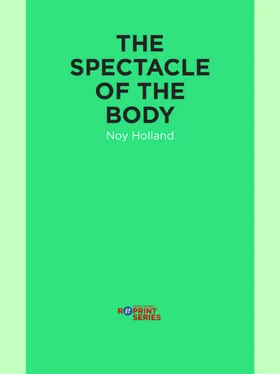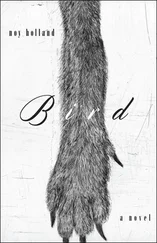The cat trod in circles in the screened-in porch.
The man squatted, set the bird beside Mrs. Finn on the arm of her easy chair. The weight of his heart he gave her, and also of his head, his forehead resting against her knees. She had her sister’s knees, he knew. His breath passed between them.
“’My heart,’ he said, ‘has gone out of it. My heart, I can tell you, is my Martha running through a door of glass. You must understand why I’ve come,’ George said. George too off his hat and his linen jacket and he set aside his shoes.”
The man slipped off Mrs. Finn’s slippers. He rolled down Mrs. Finn’s knee-high stockings and pulled them past her feet.
“’Please,’ he said. ‘Give Martha my love.’
“He loved you very much, you know. He sent me with his love,” the man said.
The bird let out a broken scream, its plastic tail caught between Mrs. Finn’s lips; her legs, like two wings, parted.
The man nuzzled her cheek, her tiny mouth. She bit him.
“Are ye livin’ in the shadder of the cross?” she whispered.
She could smell George’s smell on his clothes.
“Shadder of the cross,” the man whispered.
“Shadder of the cross,” he said.
At night, we kept watch for turtles. We made our beds one bed to lie across together, our pillows pushed up in the window we had popped the screen from. There was a broken place in our yard, our garden. We could lean up onto our pillows at night and watch out over the garden.
This was in the yellow house; it was swallowed up by trees. Vines grew into the kitchen.
This was the summer before our father left. Our mother lay at the back of the house.
There were trains at night, and whippoorwills, the sounds our mother made at night went out across our yard. We moved Mother’s bed to the window — so she could see the sun and moon, so she could see the garden.
We let the animals harvest the garden — the mule deer and the whistle pigs, the rabbits nosed through our broken place — the things you have to kill to catch. It was easy, catching turtles. We leaned into the light from our window. My brother whistled a marching call to tease the turtles out two-by-two: Sugar and Vernon, Oscar and Doll. That was what Orbit had named them. Every turtle we caught, we caught again. We carved their names with a crooked nail in the soft shells of their bellies. Our own names, we carved into the trees.
We named our dog Bingo then. Our father had named her Jane. We let her come sleep in our room with us, in our beds, underneath our bedsheets, her head on Orbit’s pillow. We kept Bingo’s tail in our pockets. Our turtles, we kept in a wooden box, or we let them loose in our mother’s room before we carried them back out into our woods so would could catch them over again. We kept their box beneath our beds so we could hear them if they moved at night.
We heard Mother sing at night — Mother Goose and birdcalls. Whenever she was singing, when we could not help but hear her singing, Orbit flung the bedsheet back and went out through the window. I went to Mother with saltines, Popsicles, to feed her. She pulled the bedsheet up across her mouth, held it below her eyes, and danced, veiled — her arm dipping above the sheet, her hand fluttering out at the end of it. I heard her hips twist.
I heard the field mice, shredding her clothes, in the dresser.
When Orbit came back with his bike from the lake, I sneaked into our bed and pretended to sleep — so he could wake me, so we could hunt for turtles. Some nights he did not wake me. He curled under his sheet at the foot of the bed, and I would feel our beds rock; I would hear the box springs start to shudder and creak and our bird dog — curled up at the edge of the bed — moaning, her head underneath Orbit’s pillow. I pulled the sheet over my head to listen — to his hand pumping his tiny prick, to him breathing.
Orbit brought jars of tadpoles from the lake, scooped from weedy shallows. And frogs, gigged and bleeding, he tried in the coming days to heal. He sewed up the frogs with needle and thread, patched their lesser wounds with gauze, practiced amputations.
Without Mother, we broke rules.
We ate with our fingers, if we ate at all. We said, Fingers were made before forks .
We put tadpoles underneath our beds with the World Books, the box of turtles.
We popped the screen from our window — so we could lean out over our windowsill so we could watch for turtles. When our wonder beans swung, there were turtles. Orbit was feet-first, shouting Geronimo! , dropping past the windowsill before his bedsheets settled. He kicked away from the side of the house, lunging backward, gaining yard to the garden.
This is what it was; this is what it can have been.
We were Queen Mother and Orbit, we said, the summer she lay at the back of the house, the autumn, the spring. Our father was other places. Our father had sat with his hat at his feet, useless in the kitchen. When he stood up, he stood up walking, moving to the door.
We did not try to stop him.
We do not try to stop him.
We are Queen Mother and Orbit of the night birds and the terrapin, of the tubers and of the leaving trees.
We are a ruckus of arms in the head-high weeds, bent-kneed, dropping to stalk on our fingertips between the rows of corn. In the squash, we drop to our hands and knees and then to our bellies — elbowing, dragging our legs, too loud in our own moving sounds to hear past ourselves for prey. We watch down the rows for the beans to swing; we keep an eye on Bingo, who is standing in the windowsill, watching over us from our room. We have her broken-off tail in our pockets, and rabbit’s foot in our pockets, and the crooked nail we name them with — our Sugar, our Vernon, our Doll. Oh, we are so lucky! So grown, how blessed, such seers!
We stop in the dirt to listen.
We know Mother watches for us. We are sure she is listening for us. There are strays, after all, wilding fields, and fire — and we have seen houses splintered by wind lift like leaves from their yards.
We listen for the closing up, the hinged, hydraulic sound of the keeping shells of the turtles. Orbit howls and I, Mother and I, watch him — cat-backed, my brother, a boneless pounce of boy into a sprawling thicket. He thrashes through the vines and leaves; we see a flash of scrawny arm, a ratty patch of hair. A sorrowful moan leaves Bingo, her havocked, swallowed trill. We see my brother’s legs jerk straight, Mother and Bingo and I — then nothing; then he lies with his feet poked out of the beans as though he has been grown over.
“It’s Sugar,” he explains to me, and hands off the turtle.
A green moon is the best moon, Orbit claims, for turtles.
Our mother claims in a green moon, as rare by far as a blue moon, our father comes home and carries her out and, hand over hand, runs her up the flagpole in our yard.
We hear her pleading with the Pope at night, blind-gigging geese at night.
We have our Gander in our yard, our trough for frogs and tadpoles.
Sugar we have — and Oscar, soon to knock at our legs in our pockets.
Orbit claims that if they would let you, held open against your ear, you could hear the sea in Sugar, in Oscar, and so on — in turtles we have not yet caught to let us listen to them there. Sugar is cool underneath, where the shell smooths and smells to me of potatoes. Our potatoes, left to freeze, will grow hard as bone in winter, food for vole and shrew. Turnips we grow for their smooth skins swelling in the press of the earth; beets for their rough, knuckly peel we peel back in bed with our kitchen knife in our room I was first to be born in, our yellow house stooped and winded as far from town as from the sea.
Читать дальше











